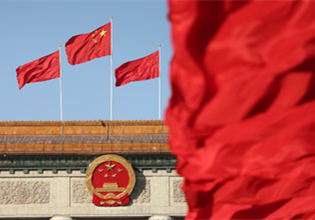Tough measures bring Beijing clearer sky
Tough measures to tackle air pollution proved effective, as Beijing reported lower PM 2.5 concentration in the first five months this year, decreasing 19 percent from the same period last year.
A work meeting on collaborative air pollution control was held Tuesday in Beijing, attended by senior officials from Beijing, Tianjin, Hebei and other provinces. Chinese vice premier Zhang Gaoli pushed the region to reach its emission reduction target during the meeting.
The participating areas all reported progress in reducing PM 2.5, which refers to particulate matter less than 2.5 micrometers that can go directly to the alveoli of the lungs and pose a major health hazard.
Beijing, plagued with filthy air in recent years, has joined hands with neighboring provinces and cities in North China to clean the air, including some of the most polluted areas in China such as Hebei and Shanxi.
Beijing called off the 8-million-ton capacity expansion plan of Sinopec Beijing Yanshan Company, and reduced the cement capacity by 3 million tons last year. It also increased the proportion of public transportation to 48 percent, while encouraging the use of new energy vehicles.
Other areas also took it seriously.
Tianjin, the closest neighbor of the capital city, abolished 1,387 coal-fired boilers to reduce coal consumption by 2 million tons last year.
Hebei province, which accounted for seven of the ten cities with the worst air in China in 2014, reduced its iron and steel capacity by 30 million tons. The region has applied National IV standard gasoline, which contains fewer pollutants, to reduce pollution on the road.
Shanxi, China’s largest coal producer, closed 2,065 coal-fired boilers last year. Shandong province eyed upgrading industrial structure to reduce pollution, by demanding that heavy polluters upgrade in accordance with the 2020 emission standard.
Inner Mongolia invested a total of 6 billion yuan ($967 million) to subsidize enterprises in smoke pollution control in 2014.



 Print
Print Mail
Mail





